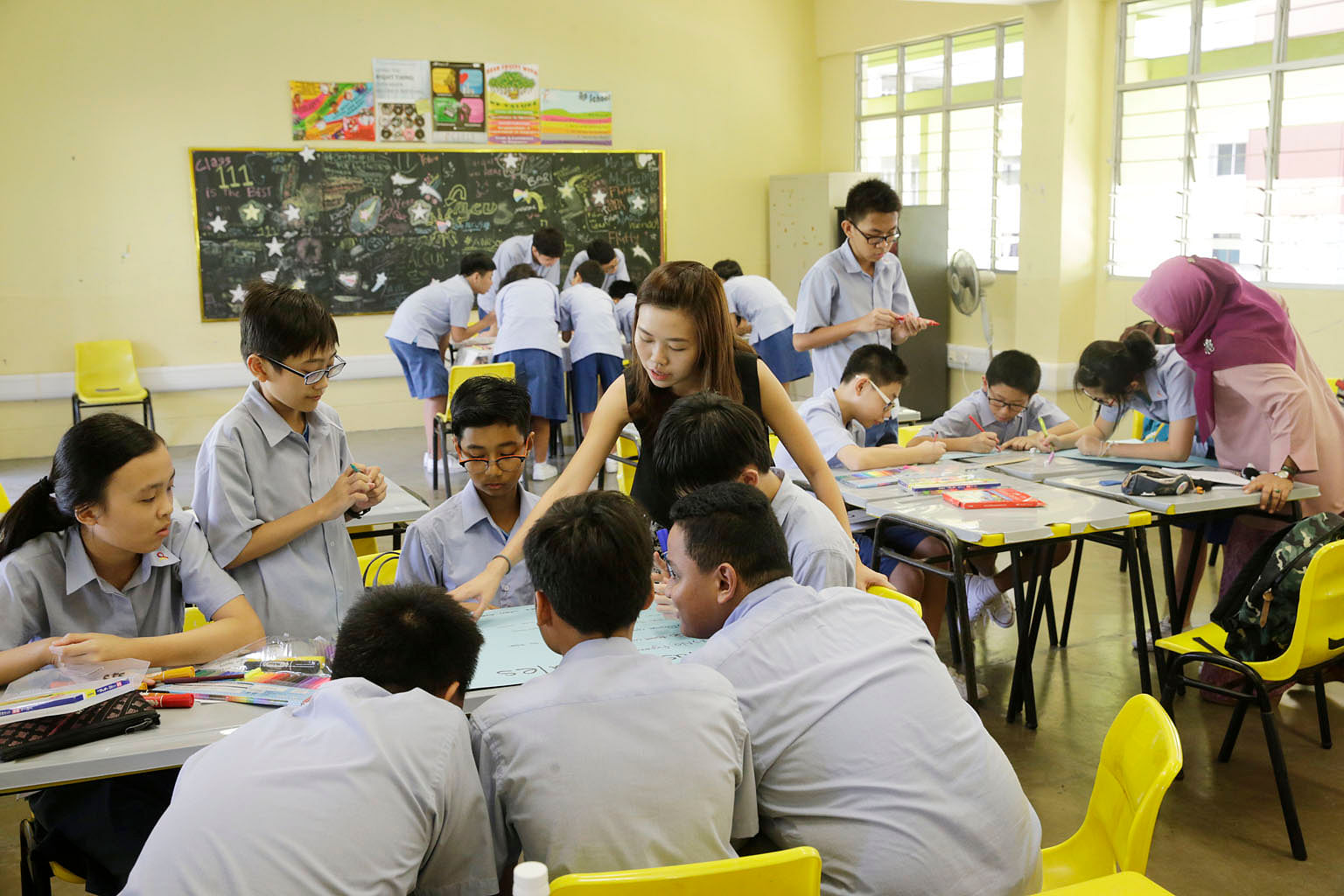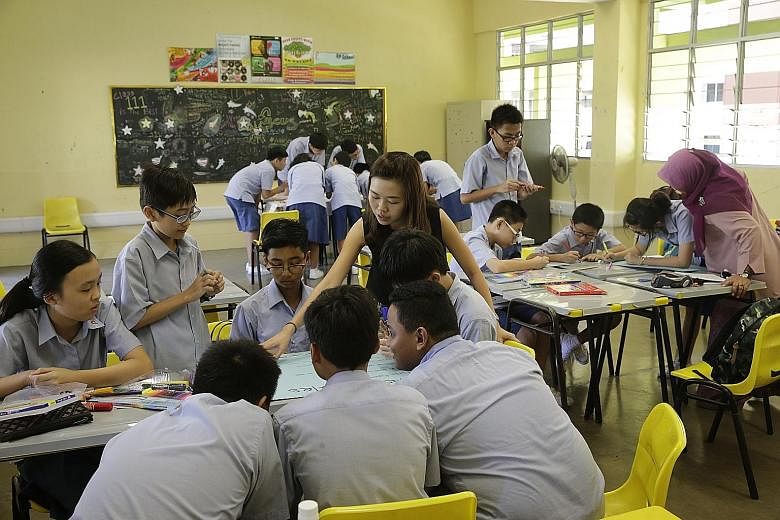When we look at the Singapore education system, we see certain things that are widely and internationally regarded to be laudable. A great deal of attention and resources are channelled into public education. Teachers receive rigorous and continual training, and teaching is a well-compensated and well-respected job. We see high regard for academic rigour - pegged to global standards of abilities, and in specific foundational subject areas (Mathematics and Science).
There is bilingual education which takes into account, to a degree, the needs of different ethnic groups, including minorities. We see attention to children with different learning styles and abilities, and we see the existence of programmes and human resources that target these differences. There are financial aid programmes in place for children from lower-income households so as to provide opportunities for material resources and extra-curricular activities.
Yet, on the other hand, there are notable differentiating mechanisms and inequalities in outcomes.
Worries about inequalities in the education system often centre on the "low-performing" and focus on "levelling up". Kids from low-income families are often the target group. The presence of numerous programmes, personnel, and public expenditure intended to level up these kids, combined with the persistence of low performance among them, leads to the perception that kids from low-income families are less motivated or lack the right home environment for studying. More generally, many Singaporeans take for granted that the system is merit-based and there are ample opportunities for everyone regardless of their family backgrounds.
These perspectives are not wrong per se, but they are insufficiently precise. In their imprecision, they inadvertently slip into faulting low-income parents for the poor academic performance of their kids. The logic goes that if our systems are fair, then surely, they fail because parents are not doing what they should be doing.
To understand why kids from low-income households do poorly in school, we would do well to understand what their lives at home are like. But we must also step back and situate their lives within the broader social context. This includes trying to understand what material conditions are like for parents, what school experiences are like for kids, and finally and least often done, what higher-income families are doing for their kids. It is when we do all this that we can have a more complete and accurate understanding of how kids from low-income families, within this system, are compelled to play a game they cannot win because someone else is setting the rules.
HOMEWORK HELP
In conversations with low-income parents, education comes up repeatedly as a major source of anxiety. Low-income parents - and especially mothers - tell me that an important reason why they need to quit their jobs or cut back on wage work is because their kids are struggling in school.
My low-income respondents cannot really help their kids with homework. Many of them barely finished primary school. My friends, mostly university graduates, tell me that by Primary 3 or 4, they struggle to help their kids with homework. A few of my middle-income respondents (from an ongoing research project) told me about attending courses in order to learn how to coach their children, particularly in Mathematics.
The reality, then, is that all parents experience deep limitations as they try to navigate their children's schooling; most of them, after all, are not teachers. Nagging, screaming, sometimes beatings, resistance, tears - these seem par for the course in parent-child interactions as parents try to help with homework.

One (university-educated) mother told me candidly that the high-pressure school system, and her anxiety about her child keeping up, makes the time she spends with her daughter rather unpleasant. She can see, and yet feels helpless to stop, the behavioural patterns that are damaging their relationship.
The difficulty of the curriculum, the understanding that exams have high-stake consequences for their kids' futures, and the difficulty of teaching one's own children, have fuelled the growth of the tuition industry. Parents with ample means use these to help their children from the get-go (in some cases as young as pre-school) and on a regular basis (that is, throughout the school years).
Parents with moderate means forgo other household needs and hire tutors in crucial exam years and/or on subjects especially tough for their kids. Tuition has become a billion-dollar industry, with parents spending significant proportions of household income on it.
'I LAZY WHAT'
In theory, all educational paths can lead to reasonable lives and decent well-being. In reality, the limited educational credentials of underperforming children of low-income parents will put them in similar low-wage jobs. It is disingenuous to claim that all tracks are good and all paths valued; if this were the case, and if Singaporeans actually believe this, tuition centres would be out of business.
How does a system that places a premium on achievement lead to these patterns of underperformance?
People who work with kids will know that students are sensitive about how they compare to their peers. A teacher I spoke with told me that students who are in lower bands say things like "I stupid lah" or "I lazy what".
They do not try because they do not believe they can possibly succeed. Teachers working with kids in low tracks have to spend time and energy on behavioural issues linked to low self-esteem and lack of motivation. They are more disruptive in classrooms and more likely to skip school or neglect homework.
This phenomenon is not something limited to Singapore nor unknown to pedagogical researchers. Jeannie Oakes, in a classic study on tracking, shows that one of the detrimental effects of tracking students according to narrow criteria of academic abilities is that students in low tracks often think of themselves as poor learners and thus do not try as hard as students in high tracks who think of themselves as capable.
In other words, "low motivation", a reason cited by educators who work with kids from low-income families, is something reproduced within the school context. Specifically, the labelling of kids is something of a self-fulfilling prophecy that shapes learning behaviours.
There are some positive things to an education system that has multiple tracks. Kids are not completely thrown out - there are still tracks open to them, which prevent them from dropping out of school altogether. At the same time, however, there also appears an irrational outcome: most of these kids appear to be of regular intelligence and do not have learning disabilities, but they are labelled "slow" from a young age.
In speaking to an allied educator whose job it is to work with kids with learning disabilities, I learnt that it takes some time for her to figure out which kids have disabilities. Why? Because most of the kids who come to her attention are "behind" simply because they have not had as much exposure to school materials and not because they are unable to learn in neuro-typical ways. In other words, given time and exposure, they are no less capable of learning than most other children.
They lack exposure for a variety of reasons: they have less pre-school education; their parents do not speak English (or the type of English required in schools); there is limited reading at home; and they do not have extra coaching by tuition teachers. In other words, the main reason they "fall behind" can be traced to their relative class disadvantages.
Turn our view around and we see that, given the ubiquity of enrichment centres and tutors, some kids - because of class advantages - are advantaged in a system where early exposure and precocity are rewarded. The kids who are able to run forward the moment the gates are open are neither more "meritorious" nor more deserving.
Why do I call this an irrational outcome? If we think of schools as places of learning, if "equality of opportunity" is upheld as our education system's mantra, and if the purpose of mass education is to train as many capable individuals as we can who will grow up to be contributing members of our society, then kids who have insufficient exposure outside of school should have sufficient exposure within it and sufficient time to even out the advantages/disadvantages resulting from class differences. They should not be punished for having insufficient exposure outside of it. By virtue of rewarding precocity - expecting kids to be able to read and write when they begin Primary 1, for example - the school system puts its role in sorting ahead of its role in teaching.
-

-
THIS IS WHAT INEQUALITY LOOKS LIKE
By Teo You Yenn
Ethos Books, 2018
The book retails at $25 (including GST) at leading bookstores and online at www.ethosbooks.com.sg.
What is our current system rewarding, and what is it punishing? It is in stepping back, going well beyond focusing on individual low-income families, that we can see what is going on.
American journalist Nikole Hannah-Jones writes about the racial segregation and inequalities of schools in contemporary US. She puts it this way: "It is important to understand that the inequality we see, school segregation, is both structural, it is systemic, but it's also upheld by individual choices... As long as individual parents continue to make choices that only benefit their own children... we're not going to see a change."
A lot of my research and writing in the past decade have been about institutions and policies. I have talked primarily about how we need to rethink the principles underlying our policies if we want to see more equal outcomes. I still believe that if we want to see significant change, we need to have collective action, we need to work to alter big structural things - rules, regulations, criteria, principles underlying policies.
But doing this more recent research, I am also continually reminded that life is lived at the micro level, at the level of everyday decisions, everyday interactions, everyday exercise of power and agency and responses to constraints and restraints.
We who have the power to make choices disproportionately shape outcomes and limit options for people who don't have the power to make choices.
It follows that if we don't share the power to make choices, we will never see a change to those things we say are bad or unacceptable to our society. When those of us who have the means maximise our own children's and our own families' advantages, we are contributing to strengthening norms about achievement, success/failure, that undermine our fellow citizens' well-being. Everyone may say, as my respondents do, that "I want my children better than me", but not everyone can see this to fruition nor have the same impact on standards and norms when they do.
As parents, we must therefore think very carefully about what we are doing when we demand that teachers assign more homework, when we ask questions about what standard our kids' peers are at, when we micro-manage our kids' lives, when we pay for tutors, when we fight to get our kids into certain schools.
Equally if not more important, we must ask what we are allowing to perpetuate when we do not resist a system many of us can now see is deeply problematic. If those higher in the social hierarchy, ahead in the pack, refuse to pause and change their ways, the call to extend assistance to the low-income or to "level up" will continue to ring hollow.
It may seem like higher-income and lower-income families have conflicting interests, that what is good for one group will be bad for another. In reality, there is a lot of potential for a better system which more truly serves the needs of all. Regardless of class, everyone is subject to state policies on education. It is becoming increasingly clear that a high-stakes, examination-oriented education system exerts costs on parents and kids across the class spectrum.
We should care because we are losing potentially valuable human resources. We will all grow old in societies populated by other people's children; our well-being depends on their capabilities. We contribute to public education precisely because there are collective returns on this expenditure. To enhance our shared well-being, we have an interest in ensuring that all kids growing up in our society can fulfil their human potential.


